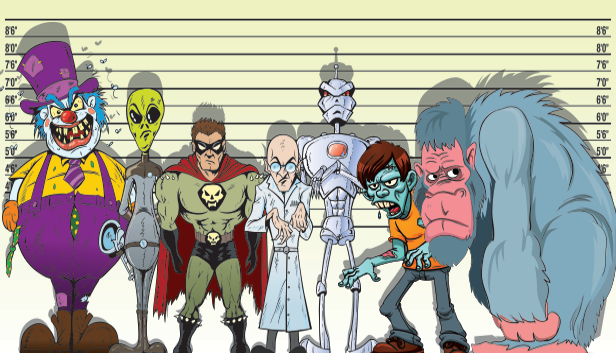
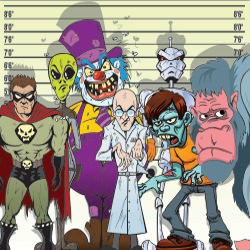 Here's what happens every 60 seconds on Facebook:
Here's what happens every 60 seconds on Facebook:
- 136,000 photos are uploaded
- 293,000 statuses are updated
- 510,000 comments
- 1.8 million Likes
Now that’s what I call engagement!
With this much information circulating each day, how do you get noticed & engage fans?
- Facebook Ads?
- Eye-catching photos?
- 10 posts a day?
These thoughts come to mind when creating a content strategy to engage your target community & increase ROI on Facebook.
But it can be hard to keep up with the amount of content we see every day -- especially via our news feed.
So in this blog post, I'll try putting your mind at ease by debunking 7 Facebook myths that may be killing your page's growth.
7 Facebook Myths that are Killing Your Page's Growth
1. Photos always get the most engagement

 We’ve all heard that photos get the most engagement. And while this may be true for some pages, it certainly doesn’t apply to everyone.
We’ve all heard that photos get the most engagement. And while this may be true for some pages, it certainly doesn’t apply to everyone.
For example, Facebook recently announced a change to their algorithm, which means more weight will be given to links in the news feed, as they state here:
“What this means is that you may start to notice links to articles a little more often (particularly on mobile). Soon, after you click on a link to an article, you may see up to three related articles directly below the News Feed post to help you discover more content you may find interesting”
So as page owners, you should definitely share more link posts as part of your content marketing strategy to get more action in the news feed.
(Another change is that new comments on posts are causing older posts to be bumped to the top in the news feed again.)
So while photos may seem like the obvious choice for news feed engagement, in reality they may not be the most effective.
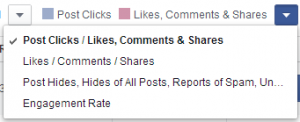
Instead of relying on guesswork or assumptions, though, just check your page insights.
Visit “Page Insights” and then select “Posts”.
Then you can segment your posts to view both the post type & the most engaging content based on clicks, Likes, comments & shares.
Scrolling through these stats weekly will let you monitor what content works (and what doesn’t) and then apply more of what works on your page to boost engagement.
Go ahead, give it a try!
2. Exactly 16% of your fans will see your posts
 We've all heard this stat before:
We've all heard this stat before:
Only 16% of your fans see your content via their news feed.
But with Facebook always tweaking the news feed algorithm, this number is constantly changing -- and is different for every post.
In fact, a recent study by EdgeRank Checker shows that
Organic reach for a typical Facebook page is just 12.6% (Click to tweet)
What does this really mean?
It means the percentage of fans seeing your posts is probably decreasing.
In fact, the more fans a page has, the more challenging it is to reach them organically.
But remember that each page is different.
You need to test, test, and test again to see what posts your fans crave & when they're online -- so you can increase engagement on your page.
3. The more you post, the more engagement you get
 One of the most common questions I'm asked is:
One of the most common questions I'm asked is:
How often should I post on my page?
Some experts answer that the more you post, the more opportunities you have to reach fans.
This is not necessarily the case -- if anything, by adopting this technique you run the risk of more fans hiding your posts than engaging with them.
With regard to post frequency, it's important to know these 2 stats about your page's community:
- when your fans are online
- what time zones they're in
With this info, you'll be better able to post at times when your fans are most active on Facebook.
4. More fans means more engagement

 If I send my update to more people, then more people will engage, right?
If I send my update to more people, then more people will engage, right?
Wrong!
This is another myth -- that the more fans you have, the more engagement you get.
Yes, having more fans increases the chance of reaching more people -- but this doesn't mean more people will engage.
The key to increasing engagement is the same for all pages:
- Post relevant content that offers value
- Post at the best times
- Post at the right frequency
Posting randomly during the day with content that's not valuable for fans will lower your reach & engagement numbers. Remember:
It’s more important to have an active community than one just based on numbers
(click to tweet)
Again, you can use Facebook Insights to drill down & define who your target audience is -- and then create content that’s relevant & offers value to them.
5. You have to boost posts to increase engagement
 We've all seen the Boost button below our status updates -- but how can boosting a post benefit your page?
We've all seen the Boost button below our status updates -- but how can boosting a post benefit your page?
The Facebook Boost button allows users a quick & simple way to promote their content to more people.
But there are some disadvantages to watch out for:
- Limited control over your bid type
- Limited control over your budget
- Limited control over your promotional period
- Limited control over targeting
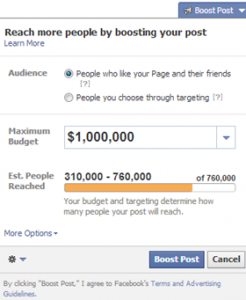
Also, once they're promoted, your boosted posts cannot be edited.
That why you may want to consider using the Facebook Power Editor to get the most out of your ad budget.
This free feature from Facebook allows you greater control over your ads, budget & the audience you target.
Ads created via Power Editor are highly customizable -- which can yield better results for your campaigns & promoted content.
Laser targeting exactly who you wish to see your posts will increase engagement as fans see content relevant to your brand & promotions.
As always, make sure to test different types of ads to see what works -- and continue to tweak & monitor your campaigns.
6. Posting on a specific day & time gets you more engagement
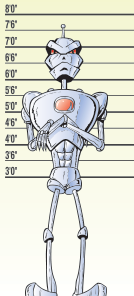 Engagement on Facebook is 18% higher on Thursdays & Fridays, according to Bitly.
Engagement on Facebook is 18% higher on Thursdays & Fridays, according to Bitly.
But does that mean you should only post on those days?
Of course not!
What works for one page or community will not necessarily work for you. Yes, there are days when your fans are more active -- but this activity doesn't always fall on the same day at the same time.
The best way to discover the online habits of your fans is to track what works best via your page Insights. There you can find the following info to help you boost engagement:
- When your fans are online
- Which post types (status, photo or links) work best
- Reach & engagement numbers for your posts
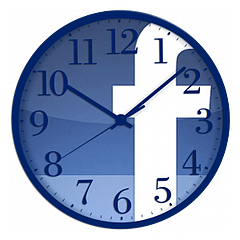
By keeping an eye on these metrics while testing different types of posts at different times, you’ll soon learn which content resonates with your audience.
Then you can:
Share more of what your customers want rather than what you think they need (Click to Tweet)
Track this information weekly & adjust your posting strategy until you find content that resonates with your fans.
7. You don't always have to reply to fans
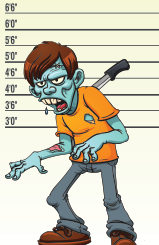 Believe it or not, more than 70% of questions from Facebook fans are ignored, according to Social Bakers.
Believe it or not, more than 70% of questions from Facebook fans are ignored, according to Social Bakers.
So what do you think -- should you always reply to your fans?
My advice here is to put yourself in the fan's shoes.
We’ve all called companies only to be put on hold forever. It’s not a great feeling!
Now imagine being put on hold for days, weeks or even months without a reply.
That's how fans feel when you don't reply to their comments or questions -- and thus leads you to not building strong relationships on your page.
It’s important to maintain a two-way dialogue when you're managing posts by fans. This shows you're listening & that you’re a brand that cares about its community.

Responding to your audience lets you build instant rapport & trust with customers.
No, we can’t be online 24 hours a day -- and yes, responding to queries takes time.
My suggestion is to respond briefly to the fan to let them know you're looking into the situation -- rather than not responding at all. And then follow up later.
But always aim to respond to ALL fan posts/comments within 6 hours.
Anything I missed?
I hope I've managed to debunked a few Facebook myths with this post.
Now it's your turn.
What other Facebook myths have you heard? Please leave a comment below to let me know. :)
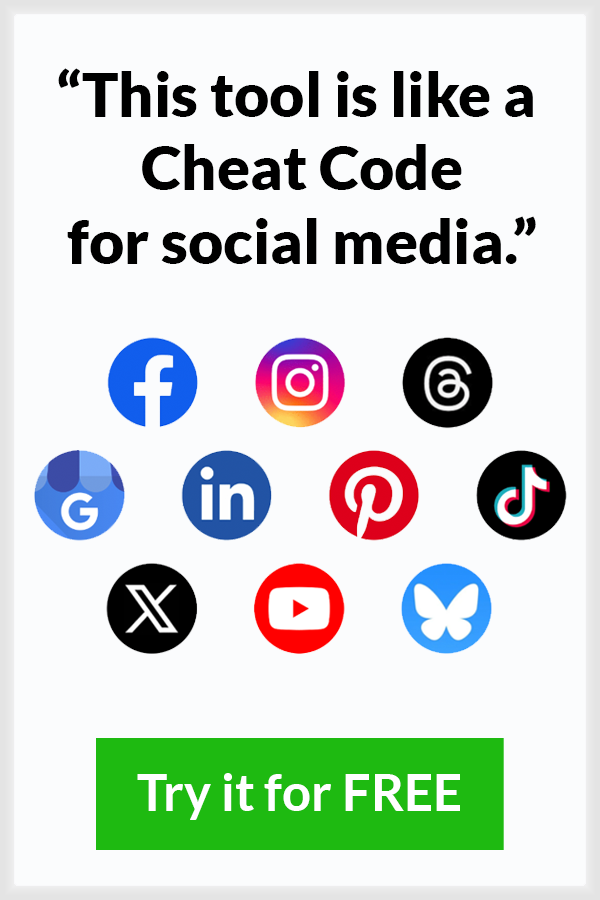





No Comments